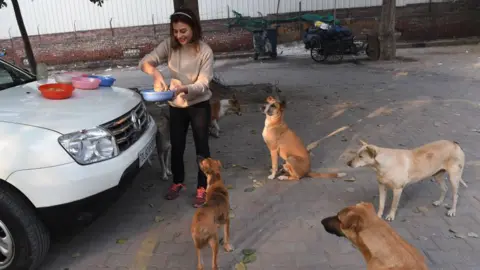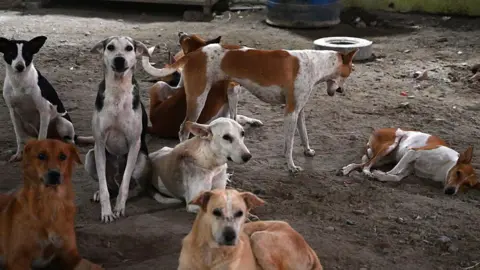Delhi split between compassion and fear as debate over feeding stray dogs intensifies
A recent Supreme Court order has sharpened tensions in the capital, where an estimated one million stray dogs pose public health and safety challenges
A recent order by India's Supreme Court has intensified a public debate in Delhi over feeding stray dogs, deepening a rift between animal welfare advocates and residents who say the animals threaten safety and public health. The dispute has led to frequent confrontations and, according to those involved, occasional instances of hostility and violence.
Animal lovers who regularly feed and look after street dogs say they are facing increased pushback from neighbours and other members of the public. Megha Malhotra, who has been feeding stray dogs in her residential complex for almost two years, said she places food at a temporary feeding spot near her building's exit gate every evening. "I enjoy taking care of them and feeding them," she said. "But of late, there have been instances where I've had to be more firm." She added that some residents have confronted her, insisting she stop putting out food.

The dispute plays out in a city where officials estimate there are around one million stray dogs, a population that civic authorities say is difficult to manage amid rapid urban growth. Supporters of feeding argue it is an act of compassion and, they say, a necessary stopgap because shelters and formal care systems are overburdened. Opponents argue that a visible street dog population can be aggressive, increase the risk of bites and spread zoonotic diseases such as rabies if animals are unvaccinated, creating a public health concern.
Municipal corporations across India, including in Delhi, operate sterilisation and vaccination drives as part of the Animal Birth Control (ABC) and anti-rabies measures aimed at reducing the number of stray dogs humanely while lowering the incidence of dog bites and rabies. Public health officials say sustained vaccination and sterilisation programmes are central to preventing disease, but those campaigns require funding, logistical coordination and community cooperation to be effective.

Legal interventions have brought the issue into sharper focus. Days after the Supreme Court issued its recent direction, the debate over whether feeding should be restricted in certain public spaces has moved from municipal meetings and social media into neighbourhood disputes and court-led scrutiny. Activists and residents say the ambiguity around where and how feeding can take place has fuelled tensions.
Those who feed animals say restricting feeding sites without offering alternative care could harm animals and drive feeding underground, making it harder for municipal authorities to vaccinate or monitor the dogs. People concerned about safety say feeding in busy public areas can attract packs, increase human-animal interactions and heighten the chances of confrontations, especially in mixed-use residential and commercial neighbourhoods.
Municipal officials and health authorities emphasise a coordinated approach. They say reducing the number of unvaccinated, free-roaming dogs requires regular door-to-door or street-level sterilisation and vaccination campaigns, public awareness about avoiding provocation of animals, safe waste management to reduce food sources that sustain large dog populations, and designated, managed feeding points where feasible. Enforcement of regulations on feeding, where it exists, has been piecemeal, officials say, and varies by locality.

Public health specialists note that dog-mediated rabies remains a preventable but persistent threat in many parts of India, and that coordinated vaccination of dogs along with prompt medical care for bite victims are proven strategies to reduce human cases. At the same time, animal welfare organisations stress that indiscriminate culling is not effective and that humane, science-based interventions are necessary.
Residents on both sides of the debate call for clearer municipal guidelines and better resourcing. Some community groups have proposed locally agreed feeding points coupled with regular sterilisation and vaccination drives, while others are urging stricter enforcement to keep dogs off busy roads and playgrounds.
As Delhi's municipal authorities and the courts consider next steps, the immediate impact is being felt on the streets and in housing complexes where those who feed the animals and those who fear them increasingly come into conflict. The dispute highlights the tension between compassion for animals and concerns about public safety and health in a rapidly urbanising city.
Officials and advocacy groups on both sides say long-term solutions will depend on sustained public health measures, consistent municipal action and community cooperation rather than ad hoc responses to headlines or neighbourhood disputes.